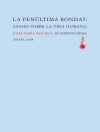The ecological crisis is a very real crisis for the many species that face extinction, but it is also a crisis of sensibility – that is, a crisis in our relationships with other living beings. We have grown accustomed to treating other living beings as the material backdrop for the drama of human life: the animal world is regarded as part of ‘nature’, juxtaposed to the world of human beings who pursue their aims independently of other species.
Baptiste Morizot argues that the time has come for us to jettison this nature─human dualism and rethink our relationships with other living beings. Animals are not part of a separate, natural world: they are cohabitants of the Earth, with whom we share a common ancestry, the enigma of being alive and the responsibility of living decent lives together. By accepting our identity as living beings and reconnecting with our own animal nature, we can begin to change our relationships with other animals, seeing them not as inferior lifeforms but as living creatures who have different ways of being alive.
This powerful plea for a new understanding of our relationships with other animals will be of great interest to anyone concerned about the ecological crisis and the future of different species, including our own.
Tabla de materias
Introduction: The ecological crisis as a crisis of sensibility
Chapter One: A season among the living
Chapter Two: The promises of a sponge
Chapter Three: Cohabiting with our wild beasts
Chapter Four: To the other side of the night
Epilogue: Adjusted Consideration
Afterword by Alain Damasio
Notes
Credits
Sobre el autor
Baptiste Morizot teaches philosophy at Aix-Marseille University.












